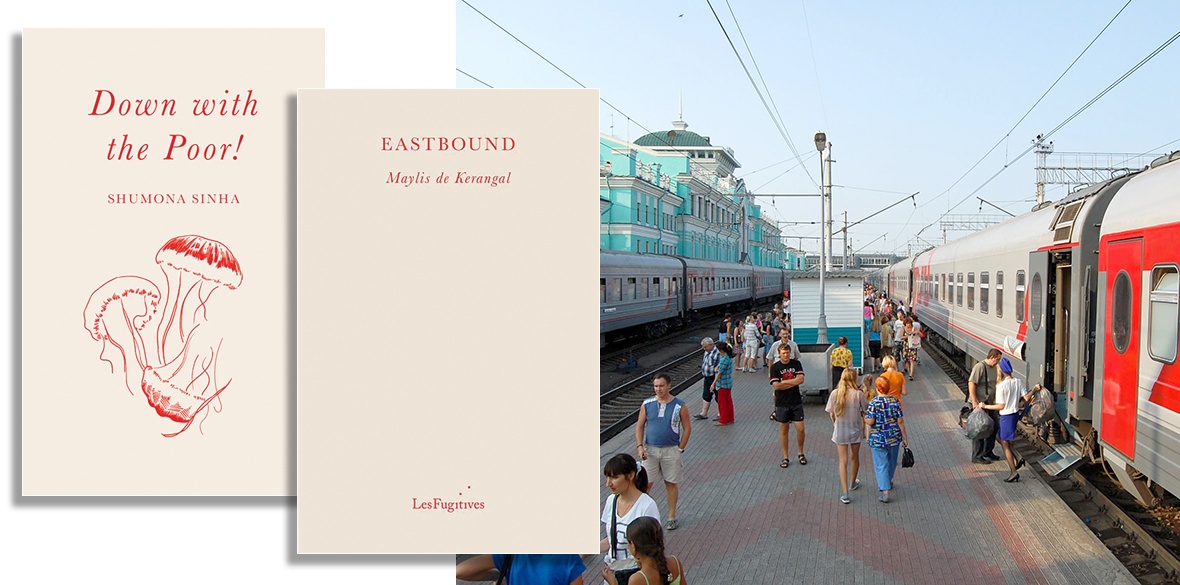This is the last article you can read this month
You can read more article this month
You can read more articles this month
Sorry your limit is up for this month
Reset on:
Please help support the Morning Star by subscribing here
Down with the Poor!
By Shumona Sinha
LesFugitives Press, £12.99
Eastbound
By Maylis de Kerangal
LesFugitives Press, £10.99
SHUMONA Sinha’s Down with the Poor! translated by Teresa Lavender Fagan, sets up a complex and perplexing position on south Asian immigration to France.
The first-person narrative belongs to a young Indian woman, a translator at asylum appeal hearings in Paris. She is spending the night in police cells having smashed a bottle over a man’s head — an asylum-seeker.
The novel’s title comes from Baudelaire’s, Assommons Les Pauvres, in which the poet/narrator beats a despised street beggar until the man rises up and fights back. But as Plato once said, never trust a poet to think out your social welfare policy.
Down with the Poor! is a compact, contentious discourse, a spyhole onto a specific element of the French asylum system and the daily enactment of the UN Convention on Refugees.
The narrator reveals self-disgust and contempt for her countrymen (they are mostly men), shame at her own proximity to their predicament, and weariness with the repetition of processed narratives.
The stories of persecution filling the translator’s working day are viewed as the putative passports to a life in Europe.
Her own journey to the city of light is never told but an amorphous dark cloud of men is described – “they were darker than their shadows at noon,” men who leave their ghettoes “only to return to their points of departure.”
The book is an unsettling digest of asylum-seeker interviews in which empathy is ambivalent and one is uncomfortable at the invasion of privacy the work trades in.
The wearisome entanglements of those working in the asylum system delivers a translator mute within the bureaucratic iron cage, lacking a back story, caught between south and north, desperately channelling a flaneur style.
In Maylis de Kerangal’s novella, Eastbound, freedom to travel, or not, shows up stark disparities between entitled westerners and the countless numbers of people held down by authoritarian autocracies.
A young conscript, the virgin boy Aliocha, is on his journey to brutality somewhere in Siberia. The story of his escape attempt rolls out in tortured time cramped within the 15 carriages of a Trans-Siberian Express train.
Translated by Jessica Moore, this is an elegant, literary take on the train journey thriller.
The gulf between rich and poor lives, the seeming inevitability of violence attending lack versus the choices money and a Western passport can provide, are played out in a gripping propulsion across the stunningly evoked landscapes of northern Russia.
The book originated in 2010 from a journey by the author from Novossibirsk to Vladivostok. Since the invasion of Ukraine, Russian military brutality has shocked the West, including the treatment of young Russian conscripts themselves.
In the character of the boy Aliocha, de Kerangal presents a universal “unknown” soldier, becoming known to us on a journey spanning the territory of banishment, “giant oubliette of the tsarist empire before it turns into Gulag country.”
Aliocha is beautifully drawn, as are the wilderness landscapes, inseparable from Russian history and literature. Against the machinic death-drive of greater forces, symbolised by the train, de Kerangal shows that maternal reparation, cunning, instinctual, and heroic, can sometimes prevail.












